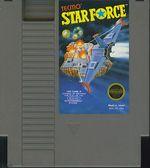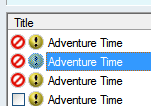Instead of a cable company-provided DVR, Leon uses a TiVo. It gives him greater flexibility, since he can transfer programs to his backup hard drives to free up space, then transfer the programs back when he is woefully short on entertainment. Only the cable networks and Time Warner Cable don’t want us to be able to do this. Where Leon lives, every program that’s not on one of the over-the-air broadcast networks is copy-protected. He can’t copy any of these shows to his backup drives. It’s as if it were 1990, and every time Leon ejected a recorded TV program from his VCR, a cable company employee stormed through the door, confiscated it, unspooled the tape, and set it on fire. Only less labor-intensive. [More]
copy protection
Starforce Accuses Critics Of Being Russian Mob
Starforce — a Russian company that sells highly-invasive copy-protection to software companies and threatens lawsuits against its critics — went up about a tenth of a notch in our books when they apologized to Stardock for posting links to illegal torrents of their most recent game, in response to Stardock’s implied criticism of their software.

When Is An Audio CD Not An Audio CD?
Reader Matt V. called our attention to Ben Laurie’s blog. Ben recently purchased a Beth Orton CD from Amazon, only to discover that it had DRM on it that prevented him from playing it on his computer. Ben has since returned the CD to Amazon and filed a complaint against them with the Trading Standards Authority (a UK consumer rights organization) that Amazon is dishonestly calling it an “Audio CD”. Ben argues it isn’t an Audio CD, because he can’t play it on his computer.

Why Starforce Sucks: DRM CSR Idiot Pirates
A brief history: for those of you who aren’t into video games, you might not have heard about Starforce, a Russian company that has become infamous amongst the gaming community for an extremely invasive and draconian copyright protection system that has, according to numerous forum posts, completely broken many customer’s computers. Starforce denies these claims and smugly mention that they recently held a contest for $10,000 dollars to prove in their office that Starforce breaks systems. According to them, no one won. The problem? They required you to demonstrate it in some Muscovite office complex, under their supervision. We doubt many people were twitching to fly to Russia just to lose a $10,000 bet on some dreamed-up technicality.



